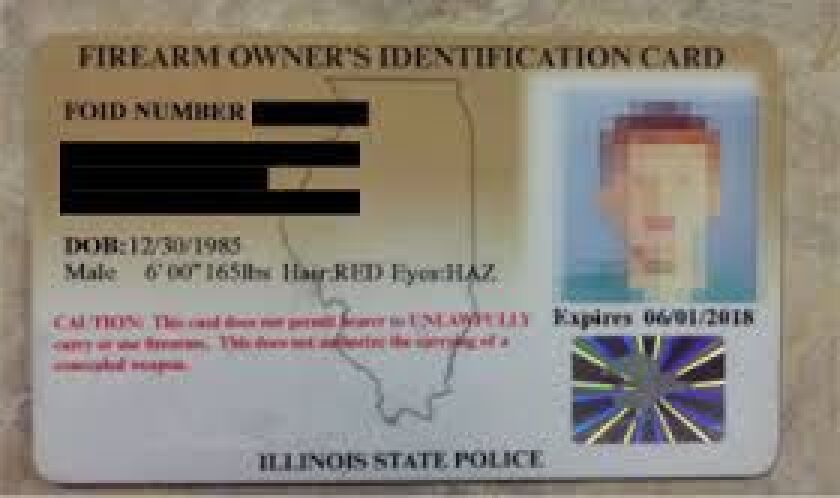Thousands of people with mental illnesses have been barred from owning guns in Illinois in recent years under measures put in place amid a wave of deadly mass shootings across the country.
But the laws have done little to take guns out of their hands, a Chicago Sun-Times investigation has found.
The laws led to an explosion in the number of people deemed psychologically unfit to own a gun in Illinois.
But the Illinois State Police weren’t tracking whether they reported what they did with their guns — a requirement under the law. The agency began to do so only weeks ago — after being asked by Sun-Times reporters why it wasn’t already doing that.
The laws also allowed for the seizure of those guns.
But that seldom happens, records show. The state police say local police are in a better position to do that. Local police, in turn, point the finger right back at them.
As a result — despite laws that have been called among the nation’s best at flagging people who shouldn’t be allowed to own guns because of mental illness — authorities say they don’t know how many of them remain armed.
The first of the two Illinois laws was enacted after the mass shooting at Virginia Tech in 2007 that left 32 people dead. That 2008 law required mental health professionals to notify the state of any patient showing “violent, suicidal, threatening or assaultive behavior.”
That was so those people could be prohibited from getting a state Firearm Owner Identification Card — required to legally own a gun in Illinois. And those who already had FOID cards would have them revoked.
It has resulted in a skyrocketing number of people stripped of the right to legally own a gun in Illinois — from 50 barred from gun ownership in 2007 to 5,000 by 2010 to more than 50,000 now, state records show.
Every day, the state police check the names of people on the database of mentally ill people deemed to be potentially dangerous against the roster of people who have FOID cards.
Last year, the state agency revoked 1,415 FOID cards because their holders were on the mental health list. And they denied new applications for the gun ownership cards from another 1,791 people.
Through the first nine months of 2015, another 1,700 FOID cards have been revoked, and 1,200 applications for new cards were denied.
Colleen Daley, executive director of the Illinois Council Against Handgun Violence, lauds the reporting requirements, saying, “Illinois has some of the best mental health reporting laws in the country.”
But what happens next when someone with a FOID card has it revoked?
Under Illinois’ concealed-carry law, which was passed in 2013 and took effect in early 2014, the state police are required to send notification letters to FOID cardholders when their cards are revoked. Local police departments are also notified by the state police when that happens.
That law gives the holders of revoked FOID cards 48 hours to:
• Turn in the cards.
• Transfer any firearms they own to the police or someone else who has a valid FOID card.
• File a report with their local police saying how many guns they have, where they are and whether they plan to transfer ownership to anyone else. Local police are supposed to forward those reports to the state police.
If the holders of the revoked cards don’t do all of that within 48 hours, the police can seek a warrant to search their homes.
Illinois State Police Sgt. Matthew Boerwinkle
Master Sgt. Matthew Boerwinkle, a spokesman for the Illinois State Police, says the agency wasn’t keeping tabs on whether people with revoked FOID cards actually filed the reports the agency ordered them to file.
That changed in late September, when it started checking on those reports after being asked about them by the Sun-Times.
But the state police don’t keep a registry of what happens to the guns themselves, Boerwinkle says.
Overall, the state police have been seizing fewer guns from people with revoked FOID cards in recent years, records show. The number is down from 400 guns seized in 2010 to 81 in 2012, 14 in 2014 and just seven this year through mid-August.
It isn’t that there are fewer guns to be seized.
Instead, it’s a matter of priorities, according to Boerwinkle.
“The priority is the violent crimes — rapes, homicides,” Boerwinkle says. “They tie up resources. Of course, guns are a priority, too.”
He says the state police aren’t the only ones who could be going after these guns.
“Locals certainly are in a better position to make these FOID checks,” Boerwinkle says.
But local authorities also haven’t made a priority of trying to recover the prohibited guns. Some say they check those they come in contact with against the no-guns-allowed list. Many don’t.
What a FOID card looks like.
In Chicago, the state has revoked 172 FOID cards because of mental illness in the first nine months of this year. Another 162 people had their applications for the cards denied.
The Chicago Police Department has seized 25 guns this year from people with revoked FOID cards, according to police spokesman Anthony Guglielmi — though not all of those were because of mental illness.
The department currently has 126 “investigative alerts” out for people with revoked FOID cards, Guglielmi says. If those people are stopped or picked up for any reason, officers are supposed to check whether they’re complying with the law. Eighteen people have been arrested this year for being in violation of the FOID law, according to Guglielmi.
In all of Cook County this year, the state has revoked 460 FOID cards from people deemed mentally ill and denied another 363 applications.
The Cook County sheriff’s office — which checks to see whether people with revoked FOID cards have guns — seized 10 guns as a result of those checks in 2014 and two guns this year through September, officials say.
Suburban police officials, though, say they don’t routinely check to see whether people with revoked FOID cards have turned them in or whether they still have any guns in their possession.
“No one ever called us and told us about it,” says Tom Kenealy, the deputy police chief in Orland Park.
So when the southwest suburban police department received its first notification from the state police about a revoked FOID card, “We were kind of dumbfounded,” Kenealy says.
So far this year, the state police have revoked 11 FOID cards for mental health reasons from people listed as living in Orland Park, records show.
Kenealy says his department typically doesn’t do anything with that information besides keeping it on file.
Even if the cardholders don’t respond to the letter from the state police, “We don’t go out to their houses,” Kenealy says. “If they told us to go and search out for these cards and take away these guns, we’d do it. But it’s a sensitive issue.”
In Naperville — where 13 FOID cards have been revoked so far this year as a result of the mental health reporting system — the police say they enter the information into their computer system so it will pop up if officers are called to that address.
But when the revoked cards or guns aren’t surrendered voluntarily, “There’s nothing we do with the residents,” Sgt. Nick Liberio says.
In Hoffman Estates, where 11 FOID cards have been revoked this year, police Sgt. Kasia Cawley says: “They’re going to have to comply with it. And if they don’t, we’re going to report that back to the state.
“We can’t just go in to somebody’s house and take their guns.”
Actually, under the law, they can. The local police can seek a warrant to search the homes of people who haven’t reported the whereabouts of their guns after having their FOID cards revoked. They can then seize any guns they find.
State Rep. Brandon Phelps. AP file photo
State Rep. Brandon Phelps, a Democrat from downstate Harrisburg who helped write the 2013 law, says he thinks the system now in place is successful because it identifies people whose mental problems make them unfit to possess a weapon.
“I think the law is strong enough,” Phelps says.
State Sen. Kwame Raoul, a Chicago Democrat who also helped craft the 2013 law, says legislators knew there were flaws in the FOID card system when they put together the new concealed-carry law. But they didn’t have much time, he says, because of a federal court ruling that ordered them to pass the law in just 180 days.
State Sen. Kwame Raoul. | Sun-Times file photo
“We focused a lot on the transfer and sale of weapons,” Raoul says. “But we didn’t really focus on what to do with people who had revoked FOID cards and continued to possess weapons.”
Raoul says it would be difficult to create a system that tracks the guns of people whose FOID cards are revoked for mental health reasons.
“In most of those circumstances, the onset or knowledge of those challenges occur after they’ve already acquired a FOID card and their weapons,” Raoul says. “Unless there was some sort of registration of weapons for all gun owners, there’s no way of really knowing what there is to confiscate.”
But that’s not likely to happen.
The National Rifle Association and other gun-rights advocates have opposed attempts to create such a registry.








